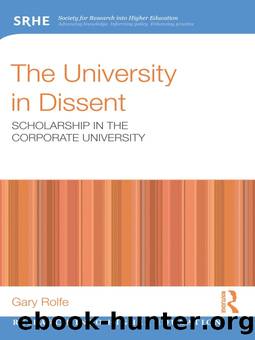The University in Dissent by Rolfe Gary;

Author:Rolfe, Gary;
Language: eng
Format: epub
Publisher: Taylor & Francis Group
Humboldt and the research-teaching plexus
When Humboldt wrote his treatise on intellectual institutions (wissenschaftliche Anstalten) at the turn of the nineteenth century, teaching and research in Germany were two very separate activities conducted by two separate groups of people in separate institutions, universities and academies respectively. Humboldt recognized, however, that the distinction was neither natural nor even planned. Rather, he argued that the system had âdeveloped in a haphazard wayâ, and that to continue to regard teaching and research as distinct, separate and exclusive activities was âpartly wrongheaded and partly uselessâ.34 Humboldtâs call for the reform of what we would now call higher education was therefore an attempt to rethink the relationship between teaching and research, teachers and researchers, and universities and academies in the face of a very similar separation of roles and functions as we are now once again experiencing two centuries later. In a warning that is as relevant today as it was in Humboldtâs time, he cautioned that âthe state must not deal with its universities as gymnasia [roughly translated as grammar schools] or as specialized technical schools; it must not use its academy as if it were a technical or scientific commissionâ.35 In other words, institutions of higher education should not be regarded merely as places where students come to be trained for work and where funded research is conducted for purely technical or instrumental ends.
Humboldtâs proposed solution was not, however, to bring universities and academies together, nor to build a bridge (nexus) between them, but rather to demonstrate that academies, those institutions concerned only with conducting research, could be dispensed with. Thus:
If one assigns to the university the tasks of teaching and dissemination of the results of science and scholarship and assigns to the academy the task of its extension and advancement, an injustice is obviously done to the university. Science and scholarship have been advanced as much-and in Germany, even more-by university teachers as by members of academies.36
Humboldtâs point was that teaching and scholarship, when conducted in the spirit of what Elton referred to as forschendes Lernen, is a superior form of research, and âit is inconceivable that discoveries should not be frequently made in such a situationâ.37 Furthermore, whereas researchers in the academies had no access to students and therefore no opportunities to practise forschendes Lernen, university lecturers encountered no such barriers to conducting academic research. Thus, âUniversity teaching is moreover not such a strenuous affair that it should be regarded as a distraction from the calm needed for research and study; it is, rather, a help to it.â38 Humboldt concluded: âIt would be entirely safe to entrust the growth of scientific and scholarly knowledge to the universities as long as they are properly conducted; this is why the academies can be dispensed with.â39
Humboldt is making two observations here. First, he is claiming that teaching, if conducted in a scholarly and inquiring manner, not only transmits knowledge but also produces it, and is therefore a powerful form of research. This was, in essence, the point that Elton took from Humboldtâs work.
Download
This site does not store any files on its server. We only index and link to content provided by other sites. Please contact the content providers to delete copyright contents if any and email us, we'll remove relevant links or contents immediately.
The Art of Coaching Workbook by Elena Aguilar(51201)
Trainspotting by Irvine Welsh(21668)
The Secret History by Donna Tartt(19092)
Twilight of the Idols With the Antichrist and Ecce Homo by Friedrich Nietzsche(18635)
All the Missing Girls by Megan Miranda(16030)
Cat's cradle by Kurt Vonnegut(15359)
Ready Player One by Cline Ernest(14677)
Talking to Strangers by Malcolm Gladwell(13370)
Fangirl by Rainbow Rowell(9253)
The remains of the day by Kazuo Ishiguro(9000)
The Compound Effect by Darren Hardy(8969)
Thirteen Reasons Why by Jay Asher(8912)
Tools of Titans by Timothy Ferriss(8396)
Periodization Training for Sports by Tudor Bompa(8273)
Wonder by R. J. Palacio(8113)
The Lover by Duras Marguerite(7903)
A Court of Wings and Ruin by Sarah J. Maas(7847)
Change Your Questions, Change Your Life by Marilee Adams(7783)
The Complete Stick Figure Physics Tutorials by Allen Sarah(7373)
